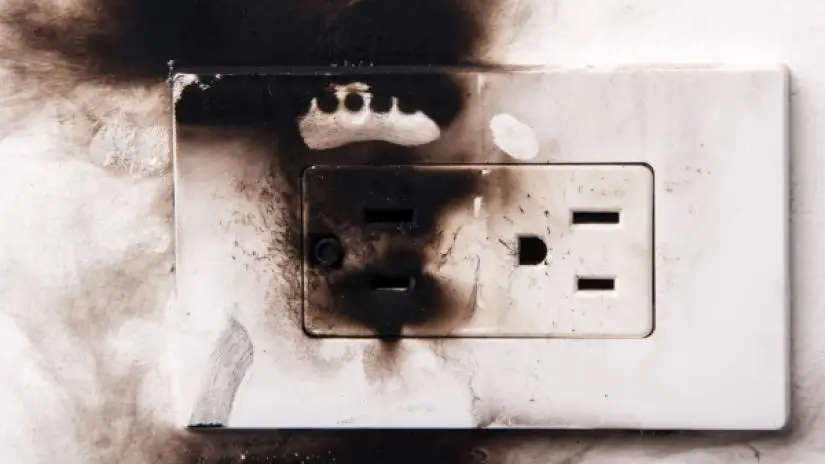
Electrical outlet fires pose serious risks to homes, often going unnoticed until significant damage occurs. Rainbow Restoration highlights key dangers and prevention tips:
|
Homeowners trust electricity to light their homes and power their appliances, rarely thinking about it as dangerous. Yet the U.S. Consumer Product Safety Commission reports, annually electrical outlets are involved in 5,300 fires, cause at least 40 deaths, and lead to more than 100 injuries. How can you prevent electrical outlet fire hazards from damaging your home? And what can you do if the damage is already done? Start by understanding the causes of these types of fires.
Why Do Outlets Catch on Fire?
Outlets transfer electrical energy from your electrical system to your appliances and devices. When there’s an issue with the wiring or the outlet can’t manage the volume of electricity flowing through, there can be excessive heat that sparks a fire.
These are some common electrical outlet fire causes:
- Outlet age. Behind aging reciprocal outlets, older wiring wears out as well. The once tightly wound wires loosen and begin arcing, which creates heat. If your home is more than 20 years old, it’s also possible that your electrical system (wear-and-tear aside) is not sufficient for supporting today’s appliances.
- Faulty wiring. Faulty wiring is one of the most common electrical fire hazards. If a house isn’t wired properly or doesn’t receive proper electrical maintenance, problems arise—sometimes only displaying subtle signs that something is wrong.
- Overloading outlets. Drawing too much energy through an outlet can make it overheat, which can lead to sparking and burning. If you don’t have enough outlets, contact an experienced electrician to add more outlets.
- Ungrounded outlets. Grounded outlets have a separate channel to allow energy from the appliance to release back to the earth instead of potentially shocking someone or causing a fire.
Related Topic: When Are Electrical Fires Most Likely to Occur?
Do GFCI Outlets Prevent Fires?
Yes, a GFCI provides a significant level of electrical outlet fire protection. Ground fault circuit interrupters (GFCIs) are devices installed in outlets that monitor the flow of energy that passes through. If the electrical current fluctuates, the GFCI cuts electricity to the outlet, preventing potential shock, electrocution, and fire.
The National Electrical Code requires GFCI use in outlets that are likely to come into contact with water, such as those that are outdoors or in the kitchen, bathroom, garage, etc. For added protection, you can choose to add GFCI outlets in other spaces as well.
Electrical Outlet Fire Prevention
Although installing GFCIs in your home can help prevent outlet fires, there are other measures you can consider to stay proactive rather than reactive:
- Inspect cords and plugs frequently for damage. Repair or replace them as needed.
- Never break off the third prong on a plug to fit a two-prong outlet. The third prong is for grounding protection and should always remain intact.
- Replace two-prong outlets with three-prong outlets.
- Avoid pulling on cords to unplug devices, as this can damage cords and become a fire hazard in the future.
- Don’t overload outlets or plug a power strip into another power strip.
- Avoid running electrical wires under carpets, as some carpet is quite flammable.
- To make sure your electrical system is safe and upgraded to legal standards, get an electrical safety inspection from a trusted electrician.
How To Put Out Electrical Outlet Fire
When a fire starts, try to put it out before it gets out of control. If the fire is already large, get yourself and your loved ones out of the house as quickly as possible, and call the authorities. Belongings can be replaced—lives cannot.
If the fire is small and somewhat controlled, here’s what to do if an electrical outlet catches fire:
- Shut off your electricity at the breaker box so electricity stops fueling the fire.
- Check your fire extinguisher’s rating. To put out an electrical fire, you need an extinguisher with a “C” in the name, such as ABC.
- If you can’t get to a fire extinguisher and the fire is still small, use sodium bicarbonate, or baking soda, to smother the flames.
- Cut off the fire’s oxygen supply by covering it with a heavy blanket and stomping it out.
Choose Rainbow Restoration for Fire Restoration and Remediation
Unfortunately—despite prevention efforts—fires still happen. If your home has suffered a fire, regardless of the extent of the damage, our Rainbow Restoration® experts can help restore the home you love. Request an appointment online or call us for fire restoration services you can trust.
